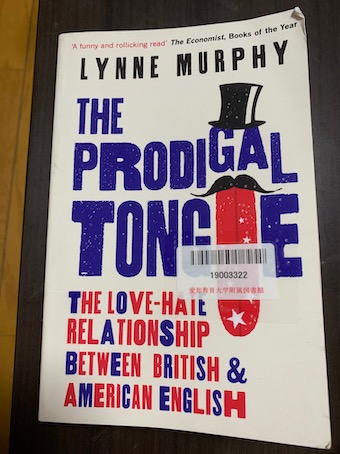
I read this in early July 2020.
The differences between British English and
American English often worry Japanese learners of English.
Although they are relatively small in the wider scheme of things,
they also worry the inhabitants of Britain and the U.S.,
particularly the former.
The author of ‘The Prodigal Tongue’, Lynne Murphy, an American
living in Britain and teaching at the University of Sussex, looks
at perception, particularly from the British side, and often
unjustified. She manages to both consider these points
academically and humourously.
Her main aim is to overturn the idea that American English has
deviated from the standard of British English. As she writes, “in
fact, British English just keeps deviating from itself." (p.116)
She reinforces her argument both seriously and less seriously,
with this joke being an example of the latter:
“An impatient American approaches a London hotel reception desk
demanding to know where the elevator is. The receptionist replies
“I think you mean the lift, which is just to your right there”.The
American doesn’t take well to being corrected. “I’m from Chicago
and we invented the damn things. They’re elevators.” The
receptionist replies, “Yes, of course sir, but we invented the
language.” (p.125)
She also gives specific examples, for example, ‘verbed nouns’
(nouns which are developed into verbs), seen by some critics as an
example of the ‘Americanization’ of English. However, when she
looks at two sections of the ‘Oxford English Dictionary’
(words beginning with ‘ca-‘ and ‘mo-‘, she found 464 verbs, 220 of
which had first been nouns. Of the latter, more than a half came
from before 1800, with the peak of this ‘verbing’ happening in the
16th and 17th centuries. There is also complexity. As she writes,
“modern day ‘caterer’ is a noun from a verb (to cater) from a noun
(cater) from a verb (to cate). (p.181)
Find out more about the book.
